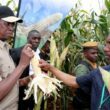A University of Zambia Lecturer from the School of Agricultural Sciences is leading a research project in Chirundu District meant to improve Cowpea varieties and increase yields.
Dr Kalaluka Munyinda, who holds a PhD in Agricultural Chemistry, said apart from increasing the yield, the research also aimed at producing improved cowpea varieties that mature early and are protective against pests.
“This project is being undertaken by the University of Zambia in partnership with other institutions such as Zambia Agriculture Research Institute (ZARI) and National Institute for Scientific and Industrial Research (NISIR). Our role is to develop improved varieties of Cowpeas using the technic called mutation induction. The first question we want to answer is the issue of yield, generally the yields are low. The other question we are trying to answer is maturity, as you know this place is a dry place, normally the rains stop early so we want a variety which matures early. Also, as you saw, the varieties have a problem with pests, the harvest pests like aphids, now this technology has managed to create a line which tolerates these pests, what it means is that when the farmer grows the crop, they use less pesticide, so that is good to reduce the cost and also at the same time reduce the chances of the crop being attacked by pests,” said Dr Munyinda.
He said local farmers in Chirundu district had been part of the research project at all stages in order to incorporate their views on the variety they wanted.
“Working together with our partners, we involve farmers at an early stage to know the variety that farmers would like, because it is important that we know what farmers want before we can promote it in different parts of the country. At the end of the day, our efforts are aimed at giving farmers the best variety which will give them an advantage in terms of yields and nutritional value,” he said.
Meanwhile, Dr Munyinda said one of the limitations of his project was lack of adequate funds.
“The challenge we have continued facing is in terms of funding because the University of Zambia does not have money specifically for research, so to carry out research work normally we have to collaborate with some research institutions outside the country. In the case of this research, we collaborate with an institute called International Atomic Energy Agency. They provide support in terms of training, equipment, chemicals, and sometimes even some funding. In the case of this year, we released two varieties for production by farmers but we required to have $12, 000 and in the department there is no way you can find that kind of money. Fortunately, one of the institutions that they are collaborating with has agreed to pay for that service for seed testing. So the major challenge is funding, we are grateful to these international partners who come on board to enable us carry out some of these research works,” said Dr Munyinda.
And a fifth year Agriculture Science student Ruth Mfune, who experimented with different varieties under Dr Munyinda’s supervision said the research project would help farmers to use different treatments to increase their yield.
“The title of my project is evaluating the Cowpea genotypes for microbial response, meaning I am also working with microbials, which are inoculants. The main purpose of this project is to show farmers that they can use certain treatment to increase the yields and reduce attacks on crops from pests. So as we have checked with other farmers, they are not using the treatment that I am using but they are using the same genotypes that I have. Different Genotypes are responding differently to microbial response, so far the data I have collected ever since this project started, I have gathered germination, the canopy, the vigor of flame genotype that I am using, also the maturity, flowery as well as the dry biomass. This project is very helpful for farmers to know the right variety to plant in order to increase their yields,” Mfune said.
She encouraged other students to take practical work and research seriously in order for them to have the skill required in the industry as opposed to concentrate on theories.
“We usually face criticism that students from UNZA don’t do much of practical work but for me I have taken it upon myself to put in my best and do practical work given to me by lecturers. There are of course some students who do not want to do practical work when given, I think it all turns back to you; how much are you willing to work? Sometimes we’ll be given field work and you will be complaining like that, but for me I have taken it upon myself that whatever I will be given right now in terms of practical, I have to do it with whole my heart and I have to make sure that at the end of it all, I learn something,” said Mfune.
And Lisitu farming block Agriculture supervisor Wiseman Mulenga said government was happy with the research work by the University of Zambia which would improve cowpea variety.
“We are happy to have the University of Zambia coming on board to help with reaearch to improve varieties. Previously all that was planted was under Musikela as a research station and under Zambia Agriculture Research (ZARI). But now with the University of Zambia coming in, in terms of research, it is helping much especially for our district because farmers now know that what they are planting has been improved and it will give them good yield, and in terms of food security it is good because farmers are able to diversify,” said Mulenga.












